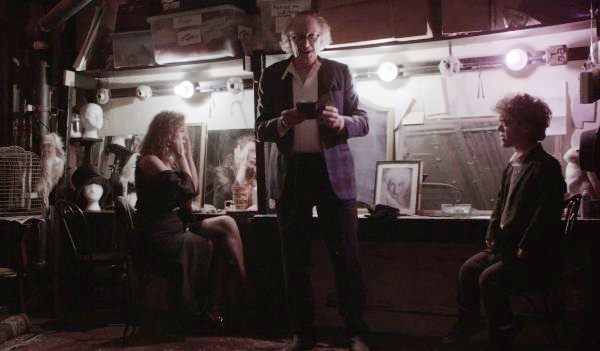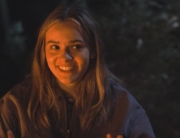
Black Magic for White Boys was written, directed, and stars Onur Tukel, who has been on the indie scene for the better part of a decade. His most high profile turn is probably writing and directing Catfight with Sandra Oh and Anne Heche. Here he is working in a significantly lower key. Apparently, the movie was shot first as a group of half hour episodes that were then reedited and occasionally reshot. Unfortunately, it’s origins show. There are a lot of characters, some who disappear just as their story arcs start taking place, and tonally it’s up and down.
Luckily, Tukel as a creator and an actor has a shambly, rakish charm, and he manages to push through a lot of issues to create something that is, at the least, watchable and, when firing on all cylinders, sharply observant. The basic plotline concerns a New York City magician, Larry (Ronald Guttman), who owns a theater that is not doing good business at all. However, he has a book of actual spells that actually work. We learn from his wife that he has gotten into trouble with them before and that they “changed” him, but he decides to use them anyway.
Meanwhile, Oscar (Tukel), a misanthrope, lives off an inheritance from his grandfather. He plans never to marry, never to work, and never to have kids. He explains this on his first date with Chase (Charlie LaRose). She can’t have kids and could care less about his lack of ambition, so it seems like a perfect match until….
Then there’s Jamie (Jamie Block), Oscar’s best friend who owns a series of apartment buildings, at least one rent controlled. He attempts to hike the rate up 30 percent, but most of the tenants, all people of color, refuse to pay, mostly because they can’t afford it. Moving among all the ensemble is a French drug dealer, Fred (Franck Raharinosy), who has a pill for literally anything. Essentially, the characters rely on magic and pills to solve their problems and discover, as we all do, that when the effects of magic and pills wear off, the problems are still right there waiting.
There are a bunch of subplots and side characters, some are intriguing, some go nowhere, but they contribute to the flavor of the piece, which is Woody Allen, if he isn’t trying particularly hard. Some of its surprises include the skill that Larry the Magician manages to excel at, but for the most part, the humor, and there’s plenty, comes from the fact that these New Yorkers are all Seinfeld-level self-involved and desperate to transform: from poor to rich, from short to tall, from bad to better person. The subplot about gentrification works the least, mostly because the actors—all of color—act as somewhat of a Greek chorus and have very little to work with and so feel, ironically, expendable.
By far, the richest strain is the part that Tukel wrote for himself, a man-child absolutely petrified of any type of responsibility who gets saddled with a pregnant girlfriend. Tukel has a charming presence that’s laid back while representing the ultimate in anxiety and narcissism. His desperation is both revolting and riotous. Kudos should also go to Guttman as the wheedling alpha magician, Larry, who is happy to sell his soul for a little adulation, and Leah Shore as Larry’s assistant, who seems to have the best intentions of the bunch.
There are too many subplots and undeveloped characters and circumstances to highly recommend Black Magic for White Boys, but there’s enough here that works for viewers to give it a shot.






Leave A Comment